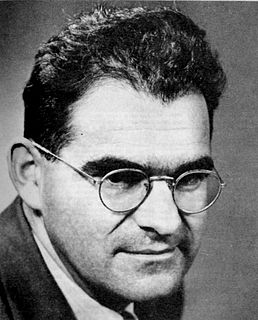A Quote by John Ruskin
All violent feelings have the same effect. They produce in us a falseness in all our impressions of external things, which I would generally characterize as the pathetic fallacy.
Related Quotes
My third maxim was to try always to conquer myself rather than fortune, and to change my desires rather than the order of the world, and generally to accustom myself to believing that there is nothing entirely in our power except our thoughts, so that after we have done our best regarding things external to us, everything in which we do not succeed is for us absolutely impossible.
If we define a miracle as an effect of which the cause is unknown to us, then we make our ignorance the source of miracles! And the universe itself would be a standing miracle. A miracle might be perhaps defined more exactly as an effect which is not the consequence or effect of any known laws of nature.
Pathology has made us acquainted with a great number of states in which the boundary lines between the ego and the external world become uncertain or in which they are actually drawn incorrectly. There are cases in which parts of a person's own body, even portions of his own mental life - his perceptions, thoughts and feelings -, appear alien to him and as not belonging to his ego; there are other cases in which he ascribes to the external world things that clearly originate in his own ego and that ought to be acknowledged by it.
The only things in which we can be said to have any property are our actions. Our thoughts may be bad, yet produce no poison; they may be good, yet produce no fruit. Our riches may be taken away by misfortune, our reputation by malice, our spirits by calamity, our health by disease, our friends by death. But our actions must follow us beyond the grave; with respect to them alone, we cannot say that we shall carry nothing with us when we die, neither that we shall go naked out of the world.
The impossibility of separating the nomenclature of a science from the science itself, is owing to this, that every branch of physical science must consist of three things; the series of facts which are the objects of the science, the ideas which represent these facts, and the words by which these ideas are expressed. Like three impressions of the same seal, the word ought to produce the idea, and the idea to be a picture of the fact.
Parents ought, through their own behavior and the values by which they live, to provide direction for their children. But they need to rid themselves of the idea that there are surefire methods which, when well applied, will produce certain predictable results. Whatever we do with and for our children ought to flow from our understanding of and our feelings for the particular situation and the relation we wish to exist between us and our child.
In this external world, which is full of finite things, it is impossible to see and find the Infinite. The Infinite must be sought in that alone which is infinite, and the only thing infinite about us is that which is within us, our own soul. Neither the body, nor the mind, nor even our thoughts, nor the world we see around us, is infinite.






































